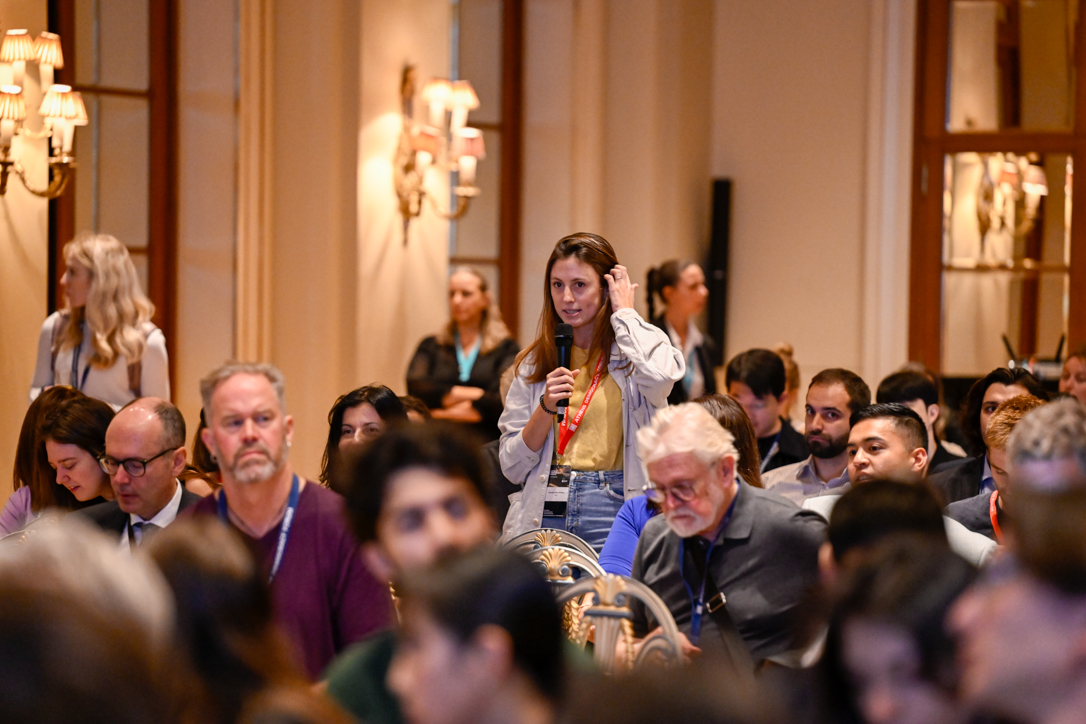Teenagers have reason to fear for democracy
Four participants in the recently-held Teens Athens Democracy Forum share their hopes and concerns with Kathimerini

As a teen, you a unique advantage: you are the master of your time. It stretches before you, allowing you to define it. Today’s youngsters, however, are grappling with challenges that seem to cast a shadow over their future, such as the looming climate crisis and the myriad threats to democracy.
At the age of 16, Angelina Kyrousi appears somewhat pessimistic. She is concerned about the state of global democracy, citing subtle influences on public opinion. “It’s intertwined with the influences we’ve been exposed to; democracy is being corrupted,” she remarks. w While this might seem like a generalization, it’s worth contemplating. And such contemplation, on this and other similar notions, is exactly what 29 teenagers, aged 13 to 17, hailing from various corners of the world, did at the Teens Athens Democracy Forum, an event organized to mark the 10th anniversary of the Athens Democracy Forum.
The students delved into issues that significantly impact their lives and communities, but also looked at their own involvement in the decision-making process. Kathimerini had the opportunity to converse with four of these participants about democracy.
Safeguarding democracy
Sixteen-year-old Panayiotis Koulouridis aspires to become a psychiatrist. He is a member of the Greek Deputy Ombudswoman for Child Rights’ teen group, which brought him to this conference and provided him with a “profound experience.”
“At the event, I had the chance to express opinions and connect with peers who have gained awareness and understand the significance of democracy. They want to address the issues that concern us in this day and age,” he says.
Koulouridis’ foremost concern centers on the impact of the climate crisis on democratic processes. He believes this crisis is fueling disparities between nations and “providing a foothold for various populist and authoritarian political movements” to ascend to power in numerous countries. “This will be a preoccupation for many nations: safeguarding democracy and preserving freedom,” adds the 16-year-old.
Vera Vasileiou, also 16, shares Koulouridis’ belief that populism is the primary adversary of democracy, even spotting signs of it within political parties. She sounds a warning about how a misguided public paves the way for the rise of authoritarian forms of government.
‘The individuals currently making decisions may not be around to witness the results and consequences of those decisions’
Regarding Greece, she views the country as fortunate in that it has well-functioning democratic institutions and an inviolable voting process. She underscores the significance of the Teens Athens Democracy Forum, where the participants were exposed to the democratic process. “Each action followed a democratic procedure. For example, we cast secret ballots to select panel speakers,” she explains.
Vasileiou doesn’t discount the possibility of future involvement in politics with the goal of “making the world a better place.”
Passionate about human rights, Kyrousi aspires to study law and believes that the world’s democratic heritage is in danger from a subconscious propaganda mechanism, stemming from the media and social networks, that undermines independent thought. She insists that “the foes of democracy are those in power who exploit it to flaunt their might.”
She also offers potential remedies: “We should scrutinize our information sources, build the self-assurance to possess independent opinions and acquire the resilience to withstand subconscious pressure to adopt opinions that aren’t truly our own.” She concludes on a somewhat pessimistic note, remarking, “To some extent, we are all being manipulated; genuine democracy appears elusive. The one who manipulates us most effectively is the one who will emerge victorious.”
Koulouridis stresses the importance of amplifying the voices of young people, especially teenagers, when discussing matters pertaining to the future. “The individuals currently making decisions may not be around to witness the results and consequences of those decisions,” he says. Koulouridis proposes changes in the education system, pointing out that the current curriculum provides only a rudimentary understanding of how the state and democracy function, lacking an emphasis on the significance of active participation in public affairs and the ability to express one’s own opinions. According to him, “this oversight often leads to abstention because the critical nature of these issues remains poorly understood.”
He asserts, “democracy ought to be actively promoted within educational institutions. However, in Greece, such efforts are being carried out rather superficially.”
All about education
Anam Tanveer turned 18 only a few days ago. Having lived in Greece for the past 11 years, she is the child of Pakistani immigrants and wears a headscarf. Anam aspires to become a gynecologist. Her participation in the conference left her deeply impressed, as she was able to express herself and be heard, while connecting with people from Greece and Europe.
Tanveer defines democracy as the right to choose without suffering any infringement on her rights. She elaborates, “I wear a headscarf. Most of my peers, my classmates, respect my opinions and embrace me. However, in general, on buses and in public squares, some people cast judgmental glances my way, as if I am to blame, as if I have wronged them in some way. They stare at me strangely and, on occasion, make unpleasant remarks. This can make me uncomfortable…”
In Tanveer’s view, there are several areas in need of improvement, such as advocating for increased representation of women and young people in politics. She emphasizes the necessity of educating young individuals and equipping them with the skills and awareness required to become effective politicians. Tanveer believes that democracy is imperiled by the disproportionate influence wielded by the top 1%.
“The solution lies in education, education, education! We need to foster active participation and prevent a situation where only a select few have a voice.”






